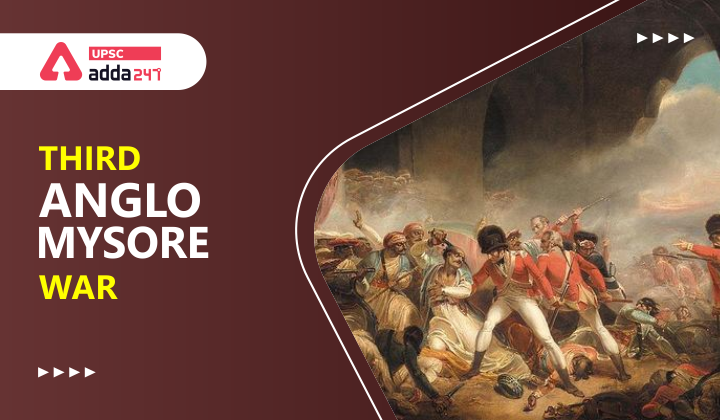Table of Contents
Third Anglo-Mysore War- Relevance for UPSC Exam
- GS Paper 1: Modern Indian history from about the middle of the eighteenth century until the present- significant events, personalities, issues.
Background of Third Anglo-Mysore War
- Second Anglo-Mysore war which ended with the Treaty of Mangalore was not enough to end the Anglo-Mysore rivalry in India.
- Supremacy to control the Deccan region was the key cause for the continued Anglo-Mysore rivalry, leading to the Third Anglo-Mysore war.
Key Causes of the Third Anglo-Mysore War
- French Connection: Tipu Sultan continued his associations with French forces despite English reservations. This was one of the key causes for the third Anglo-Mysore war.
- English Diplomacy: As part of their clever diplomacy and strategic thinking, the British started improving their relationship with the Nizam of Hyderabad and the Marathas.
- Non-adherence to the Treaty of Mangalore: Tipu sultan refused to free the English prisoners taken during the second Anglo-Mysore war as per the Treaty of Mangalore.
Course of the Third Anglo-Mysore War
- War on Travancore: Tipu declared war on Travancore in 1789 which was a friendly state of the British.
- Beginning of Third Anglo-Mysore War: Invasion of Travancore angered the British who under the leadership of the Governor-General of Bengal, Lord Cornwallis declared war on Tipu in 1790.
- Result of First Phase: In the first phase of the third Anglo-Mysore war, Tipu was defeated and his forces had to retreat.
- Later, British made advances towards Tipu’s capital, weakened tipu then has to bargain for peace with Britishers. This led to the treaty of Seringapatam.
Third Anglo-Mysore War Treaty- Treaty of Seringapatam
- About: The Third Anglo-Mysore war ended with the Treaty of Seringapatam in 1792 between Tipu Sultan and British Forces.
- Provisions of the Treaty:
- Loss of Territory: Tipu had to cede half of his kingdom to the alliance of the British, Nizam and the Marathas, including the areas of Malabar, Dindigul, Coorg and Baramahal.
- War Indemnity Clause: Tipu was made to pay a war indemnity of Rs. 3 crores to Britishers. Half of it was to be paid instantly and the other half was to be paid in installments.
- Tipu also had to surrender two of his sons as surety to the British till he paid his due.
- The Third Anglo-Mysore War destroyed Tipu’s dominant position in the Deccan region and firmly established British supremacy in South India.





 TSPSC Group 1 Question Paper 2024, Downl...
TSPSC Group 1 Question Paper 2024, Downl...
 TSPSC Group 1 Answer key 2024 Out, Downl...
TSPSC Group 1 Answer key 2024 Out, Downl...
 UPSC Prelims 2024 Question Paper, Downlo...
UPSC Prelims 2024 Question Paper, Downlo...





